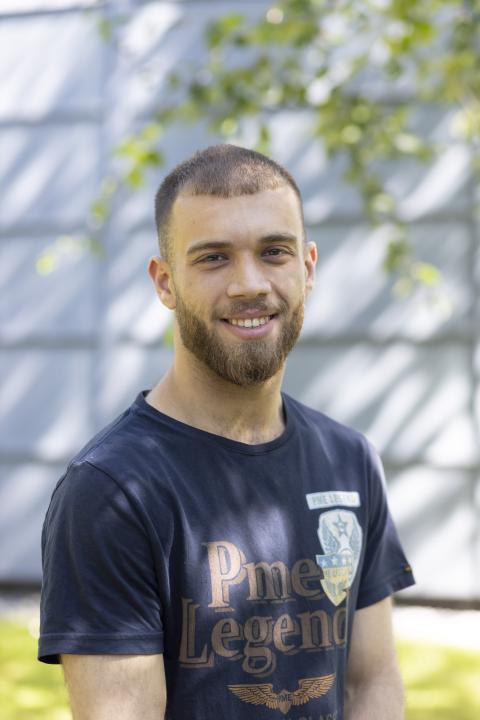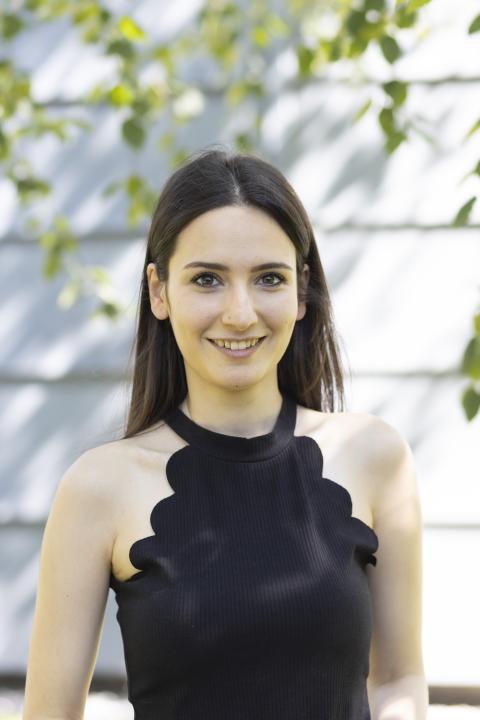Farah and Osama took the pre-Bachelor’s program: “The reward was great”
Syrian students Farah Khabbaz and Osama Alhassan took the pre-Bachelor’s program at Tilburg University. The Tilburg University Fund Foundation contributes financially to this academic preparatory program. Both students are now in their second year of the Cognitive Science and Artificial Intelligence program. “I have a future again.”
When she was 22, Farah Khabbaz (26) fled to the Netherlands with her father, mother, and brother. Strangely enough, she can remember little of her life in Syria. Because she was in survival mode, her brain more or less normalized the events of that time. She does have vivid memories of her first years in the Netherlands, but they aren’t happy ones. “I felt quite lost. All my friends lived in other parts of the world. I had no Dutch at all, which made it hard for me to make new friends. I took Dutch courses, but was placed in a different group every two months. I really missed someone to talk to. And I had no idea what to do with my life.”

Osama Alhassan (21) was at a similar dead end. He was 15 when he and his cousins fled to the Netherlands via Turkey. The journey took 24 days. He spend eighteen months in the reception center in Grave and then moved to Veghel. Two years after his flight he was reunited with his parents. “In Grave, I was allowed to take classes at preparatory vocational secondary education (VMBO) level, but I had a recommendation for the two highest secondary education levels. I had no choice because my Dutch was insufficient. It was hard. The level was too low and, as a sixteen-year-old, I was in a group of thirteen-year-old children.”
Skipping school
Osama skipped classes a lot and had to answer in court. Because he lacked the supervision of his parents, he was given a second chance. He pulled himself together and finished years 3 and 4 in one year in the adult general secondary (VAVO) program. The next step was senior general secondary education (HAVO), but ten days before he was due to start, it became clear the program had been discontinued. “It was a total surprise for me. From a young age, I knew I was going to go to college and now I had run into another wall. Via the boy next door to where I live I heard about the pre-Bachelor’s in Tilburg. When I called, someone had just dropped out of the program.” Osama met the requirements and passed the entrance exams.
In September 2020, he started with the pre-Bachelor’s, together with fellow student Farah. “I heard about it via a friend,” Farah says. “I remember the interview I had with our mentor Kathelijn van Heeswijk very well. I was so nervous. She gave me the feeling “I can do this”. My life began again at that moment.”
Text continues below photo.

Big gap
At the academic pre-Bachelor’s, refugee students prepare for an academic Bachelor’s program. They are taught Dutch, English, and Math, and there is much attention for personal coaching, academic skills, and choosing the right program. After completion, students receive the civic integration diploma of the Dutch government and the pre-Bachelor’s certificate. The latter gives automatic access to a Dutch or English-language Bachelor’s program at Tilburg University. At other universities, additional admission requirements may apply. Last year, Tilburg pre-Bachelor’s students also continued at Radboud University Nijmegen, Avans University of Applied Sciences, and The Hague University of Applied Sciences.
Osama: “The exit level of the pre-Bachelor’s is equal to pre-university education. That is quite a big gap with the VMBO exit level. I had one year to learn all the material. At one point, I decided that it didn’t matter how hard it was. It was about motivation. I worked really hard, and the reward was great.”
Talents
“I found the languages hard,” Farah says. “I had little difficulty with math. In Syria, I studied Engineering. There you just take the program that fits your talents. After the pre-Bachelor’s in Tilburg, I was free to choose a follow-up program. That was a problem. There are so many different things to choose from and I wasn’t used to making my own choices. Finally I decided for Cognitive Science and Artificial Intelligence. In this program, my interest in the brain and my technical insight come together. I’m now in my second year. When I finish my Bachelor’s, maybe I want to work for a year before continuing with a Master’s. I hope it will also help me to choose what I want to graduate in next.”

Recently, Osama has successfully passed the last exam in the second year of his Bachelor’s program. “I really enjoy Cognitive Science and Artificial Intelligence because it touches upon the subject of neuroscience. I want to do the Master of Data Science and Society program next. That will take another year. Then I really want to get a job.”
Personal attention
Four pre-Bachelor’s students continued with the Bachelor’s of Cognitive Science and Artificial Intelligence at Tilburg University. All students who started the pre-Bachelor’s program in 2020 successfully completed it in one year. In no small part thanks to mentor Kathelijn van Heeswijk. “If you were absent, she used to call or e-mail you: ‘Are you coming?’ Everyone received personal attention,” Osama remembers.
Farah: “Kathelijn took my hand and held it in hers. That was exactly what I needed. Thanks to the pre-Bachelor’s program, I have a future again. When I started here, I was under a lot of stress. That is all in the past now.”
The pre-Bachelor’s program is financially supported by the Tilburg University Fund Foundation.
Become a donor
With your donation to the Tilburg University Fund, you can support various Tilburg University projects. Projects that can achieve just that little bit more with a financial impulse. Or initiatives that require a financial contribution to get started.
Date of publication: 2 August 2022
